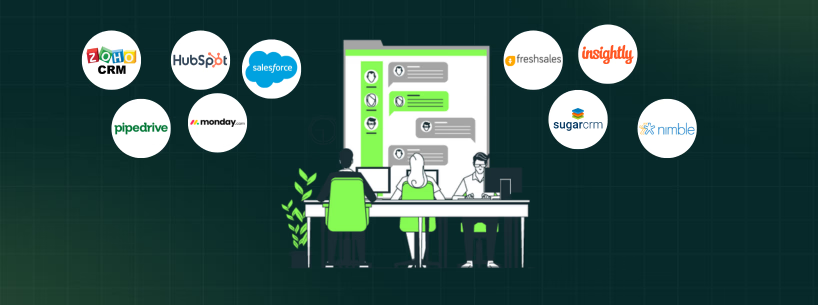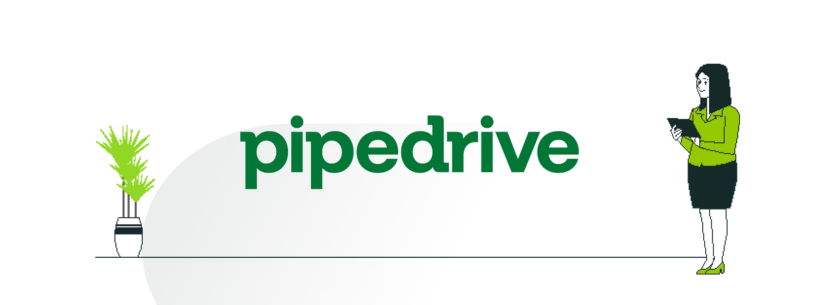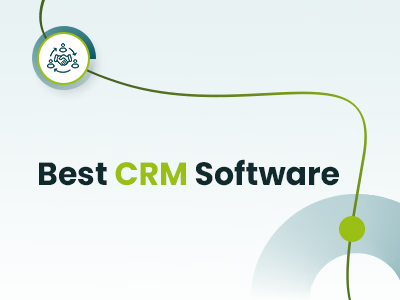
Managing customer relationships is challenging. Businesses struggle with scattered data, losing track of customers, and missing follow-ups that make it difficult for them to keep up with leads and stay organized. That’s where customer relationship management (CRM) software come in. They help save time, stay on top of tasks, and work more efficiently.
With so many CRM options available in the market, choosing the one that truly fits your business requirements and goals can be challenging. To make things easier for you, we have curated a list of the best CRM software options to help you find the right solution for your needs.
Software | Rating | Free Trial | Starting Price |
Zoho CRM | 4.7 | 15-day free trial | $20/user/month |
HubSpot CRM | 4.6 | N/A | Free |
Salesforce CRM | 4.0 | 30-day free trial | $25/user/month |
Pipedrive CRM | 4.5 | 14-day free trial | $19/user/month |
Monday CRM | N/A | 14-day free trial | $15/user/month |
Freshsales
| 4.2 | 21-day free trial | $11/user/month
|
Insightly | 4.4 | 14-day free trial | $29/user/month |
SugarCRM | 4.4 | N/A | $59/user/month |
Nimble | 4.5 | 14-day free trial | $29.90/user/month |

Zoho CRM software is an intuitive, AI-powered platform that provides a dedicated space for teams to manage all phases of sales, marketing, and customer support effectively. It offers smart sales AI agents that combine AI and human skills to handle various tasks, from sales development and coaching to follow-up schedules. It allows teams to focus on building strong customer relationships. It supports custom workflows, multiple channel communication, and portals for customers, partners, and vendors.
Additionally, with features like blueprints, customization, and business analytics, teams can close more deals and measure performance in real-time.
Suitable For: Startups, finance, insurance, real estate, education, and retail
Top Integrations: Microsoft 365, Mailchimp software, Shopify software, Zoom, LinkedIn, Slack, and Trello software
Key Features
- Territory management
- Kiosk Studio
- Business Intelligence
- Forecasting
Pros
- Provides real-time insights through advanced analytics and customizable dashboard
- Improves efficiency and saves time due to centralized data management and automation
- Enables fast information sharing and quick data insights with various function-based dashboards
Cons
- The interface is dated and can be difficult to navigate for a new user
- Automation of reports and data can be improved

HubSpot CRM software is a unified system that offers features such as Breeze Copilot assistance, contact management, deal tracking, data synchronization, and reporting dashboard for managing customer relationships. It offers a flexible data model where custom objects, events, and calculations can be defined, along with AI-powered tools that enrich records and surface key insights. The product also supports multiple data views including table, kanban, calendar, map, and Gantt formats.
In addition, the platform also provides a landing page builder, AI email writer, and a meeting scheduler that directly connects with customer data without the need for a separate platform. The software also helps build better relationships with customers and accelerate business growth.
Suitable For: Startups, real estate, healthcare, and fitness
Top Integrations: Gmail, Outlook, Shopify, Mailchimp, Slack, Zoom, and Stripe
Key Features
- Document sharing
- Email templates
- Chatbot builder
- 1800+ apps in the app marketplace
Pros
- Offers live dashboard to monitor engagement and progress in real time
- Provides insights that helps to improve customer relationship
- Keep records of contact history withing contact logs
Cons
- Navigation can be confusing due to several tools option
- Email formatting when pasting in text can be inconsistent

Salesforce is a cloud-based CRM that brings a 360-degree view of customers, data cloud and AI agent force on one integrated platform. It helps teams create personalized experiences and build strong relationships across sales, marketing, commerce, and IT departments. Its built-in Einstein generative AI brings prediction, generated content, and conversation UI in every app and workflow. It enables users to customize prompts, build agents, models, and automation with low-code tools on the Salesforce platform.
Moreover, with Success Ecosystem, it offers expert guidance, self-service resources, and data-driven insights that help users maximize return on investment (ROI) and achieve long-term growth.
Suitable For: Automotive, communication, education, healthcare, and nonprofits
Top Integrations: Jira software, LinkedIn, Quickbooks, Mailchimp, and Slack
Key Features
- Automated environmental, social, and governance (ESG) reporting
- Agent-driven content creation
- AI-powered multi-touch attribution
- Einstein trust layer
Pros
- Offers a 360-degree view of customer journey through its features that boosts conversion and follow ups
- Provides automation tools, customizable dashboard, and real-time tracking that helps sale teams stay productive
- Manages customer tracking, view interaction history, and log updates from multiple channels
Cons
- Tracking custom metrics can be difficult without considerable salesforce experience
- User interface is less intuitive which can slow down the productivity

Pipedrive CRM is a sales pipeline software that is specifically built for sales teams, allowing teams to track deals, manage leads, optimize sales processes, and close deals efficiently. Its intuitive interface and customized kanban-style dashboard provide clear visibility into the sales process, helping teams manage leads and boost conversion rates. With email tracking, smart docs, and integrated calling features, it ensures complete contact management, timely follow-ups, and faster deal closure. This software offers an ‘Email Builder’ that lets sales and marketing people create professional email campaigns and engaging content without requiring HTML and basic design skills.
Furthermore, its AI suggestions, forecasting, and advanced sales metric tools track sales and provide real-time insights to make an informed decision.
Suitable For: Real estate, nonprofits, event management, and travel agencies
Top Integrations: Slack, Trello, Asana, Zoom, QuickBooks, and Google Workspace software
Key Features
- Deal and lead labels
- Web forms
- Lead inbox
- Email builder
Pros
- Easy to navigate for users with no technical experience
- Built in reminders and activity tracking ensure timely follow ups to stay on top
- Offers smooth and organized sales management process
Cons
- Marketing capabilities are basic and lack advanced automations
- The contact list requires manual refresh when new records are added

Monday CRM is a highly flexible and customizable no-code platform that allows teams to manage pre-to-post sales activities, making the whole sales cycle smooth and organized. Users can increase and improve contact engagement with the right messages at every stage of the sales process by using personalized sequences, bulk email with tracking, and AI email writing features.
The platform provides a custom dashboard, sales forecasting, and activity tracking tools that give clear visibility of deals progress, team activity, and performance tracking in one centralized platform.
Key Features
- Duplicate data merging
- Sales forecasting
- Mass emails
- No code automations
Suitable For: Real estate, IT, media, manufacturing, finance, and healthcare
Top Integrations: Gmail, Slack, Mailchimp, Gitlab, and DocuSign
Pros
- Customized dashboard and pipelines that align with workflow needs
- Offers clean and intuitive interface
- Provides forecasting and sales pipeline insights through dashboard and AI driven columns
Cons
- System has limited reporting capabilities
- Switching from older platforms require extra set up to map contacts and accounts accurately

Freshsales by Freshworks is an AI-powered sales CRM that provides users with a pipeline view to effectively manage deals and drive conversions. The software offers a unified contact management system with real-time data insights, task automation, and customizable sales sequences that help teams track sales, nurture leads, and close deals faster.
With its built-in Freddy AI, users can create personalized emails, find potential customers, and gain deal-specific insights. It helps make informed decisions and optimizes the sales process to finalize deals.
Key Features
- Kanban view for contacts
- Contact scoring by Freddy AI
- Email templates
- Visual deal pipeline
Suitable For: IT, e-commerce, manufacturing, and logistics
Top Integrations: Google calendar, Slack, Microsoft Teams, and Google Analytics
Pros
- Has a user-friendly interface that make it easy to use
- Contact management and pipeline feature improve the management of client relationship
- Offers tools for customizable pipelines and automated workflows that simplify sales process
Cons
- Lacks quick options for removing duplicates
- No centralized task review feature for managers to see all assigned tasks

Insightly is a modern CRM that is built to scale with fast-growing businesses. It helps companies manage leads, automate workflow, and close deals. The platform makes customization easy and intuitive, which improves communication, collaboration, and CRM adoption without requiring third-party developers. Users can evaluate business performance and dive into data details with flexible reporting and real-time dashboards.
The software offers privacy controls and security options to save data information. It is SOC type ll certified and complies with GDPR and HIPAA standards to meet security requirements. It also supports single sign-on, two-factor authentication, and full encryption of data both in transit and at rest.
Key Features
- AI email summaries
- Scalability
- Customer email management
- 50 ways for data visualization (through dashboards)
Suitable For: Agencies, healthcare, finance, manufacturing, and solar
Top Integrations: QuickBooks Online, Workday, Unbound, Jira, Slack, WordPress, and Shopify
Pros
- Offers flexibility to create custom fields, templates, and dashboards
- Easy to navigate after initial set up
- Easy to get proposal and upload documents in one single platform
Cons
- Lacks option for task reminder
- Uploading leads often results in duplicate entries

SugarCRM software is a flexible platform that keeps customer, product, and sales data in one place. It gives businesses a complete 360-degree customer view to track and manage all the interactions. With built-in AI analytics and automation, teams can check the status of every deal, get suggestions, visualize performance, and predict revenue. The software offers two drag-and-drop tools, such as ‘Sugar Studio’ and ‘SugarBMP’, at no extra cost. These user-friendly tools help teams customize fields and automate repetitive tasks to improve efficiency and productivity.
Key Features
- Sugar studio
- Quota tracking
- Visual pipeline dashboards
- Closed-won predictions
Suitable For: Manufacturing, wholesales, distribution, and autoparts
Top Integrations: Microsoft SharePoint, Dropbox, Zendesk, SAP, SYSPRO, and Sage
Pros
- Offers simple layout
- Centralized dashboards help view everything in one place
- Provides clean and unified interface for case management
Cons
- System response tends to slow down high traffic volume
- Lacks multiple device login options

Nimble is an AI-driven CRM that is built to enhance engagement, build relationships, and drive business growth from one simple platform. Users can view team tasks, activities, and call-in customizable dashboards. The software unifies sales and marketing under one contact record, offering unlimited emails, customizable templates, and flexible models to deliver budget-friendly campaigns. Nimble’s Prospector browser extension brings CRM and sales tools right into your inbox and across the web. It helps users find leads, build connections, and close deals faster.
Suitable For: Solopreneurs, education, IT, and marketing
Top Integrations: Google Workspace, Microsoft 365 software, Dropbox, and Mailchimp
Key Features
- Relationship management
- Email marketing
- Custom web forms
- Workflow and automation
Pros
- Provides contact builder to easily record contact across social media sites
- Offers tools to easily track customer activity
- Keeps information centralized, reducing time spent switching between tabs
Cons
- Difficult to send emails in group to all contact lists
- Lacks the ability to set recurring tasks for specific days of the week
While selecting any CRM platform, it is important to ensure that CRM software aligns with your business's unique needs. Below are the key considerations that will help you narrow down your options:
- Define Your Objectives: Before choosing a CRM, you need to figure out what you want the platform to achieve, whether it is increasing sales, improving customer support, or simplifying marketing. Setting clear goals guide you choose the right software for your business
- Make List Of Must-Have Features: Every business has unique needs. Create a list of essential features to guide your selection. Prioritize capabilities such as automation, contact and lead management, mobile accessibility, customization, reporting, analytics, and integrations with existing tools. This list help to focus on those CRMs that can support your business effectively
- Consider Scalability: As your customer base expands, you may need to add more users, larger data storage, and advanced features. Make sure that the CRM can scale with your business. This ensures long-term stability and prevents costly system changes in the future
- Set Your budget: The next step to clarify is your budget. CRM pricing varies by platform and features. Avoid focusing only on upfront cost, also consider the total cost of CRM including add-ons, implementation, training, and upgrades. So, it is important to decide how much you can spend. It allows you to quickly rule out platforms that fall outside your price range and focus only on realistic options
In the end, only you know what your business truly needs from a CRM. The list of tools that we have rounded up above gives you a solid starting point, but your final pick should be based on your goals, team size, and day-to-day operations.
Whichever CRM you choose, make sure it fits into your existing workflow and doesn’t add complexity. Most of these platforms offer a free trial; use it to explore the interface, test key features, and get feedback from your team before making a commitment.
